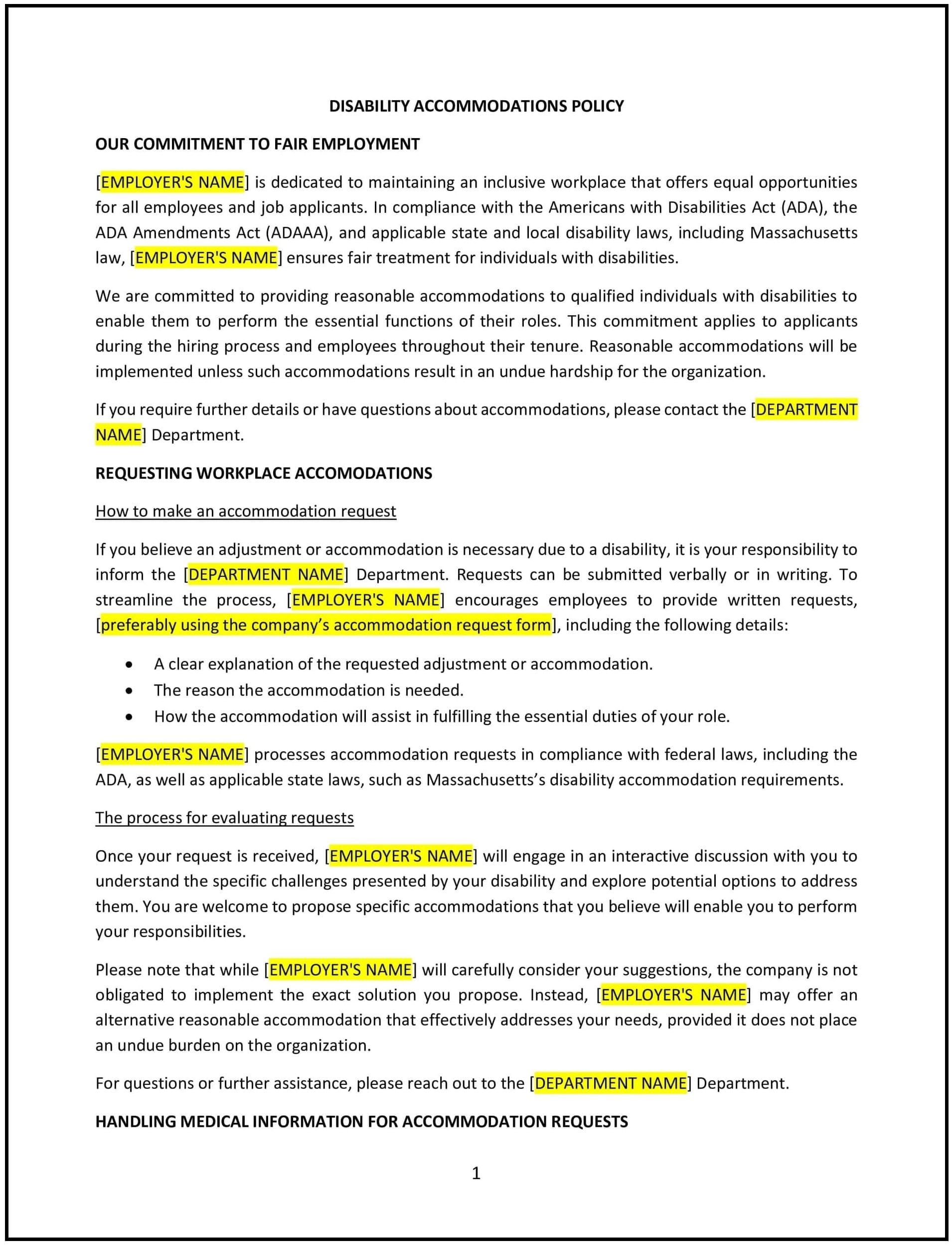Disability accommodations policy (Massachusetts): Free template
Got contracts to review? While you're here for policies, let Cobrief make contract review effortless—start your free review now.

Customize this template for free
This disability accommodations policy is designed to help Massachusetts businesses establish guidelines for providing reasonable accommodations to employees with disabilities. The policy outlines how the company will respond to requests for accommodations, the process for requesting accommodations, and the procedures for assessing and implementing these requests in compliance with Massachusetts state laws and federal regulations, such as the Americans with Disabilities Act (ADA).
By adopting this policy, businesses can create an inclusive and accessible workplace, atrengthen compliance with legal requirements, and provide the necessary support for employees with disabilities to perform their job duties effectively.
How to use this disability accommodations policy (Massachusetts)
- Define disability and reasonable accommodation: Clearly define what constitutes a disability under Massachusetts and federal law, as well as what is considered a reasonable accommodation. Examples of accommodations may include modified work schedules, accessible workspaces, assistive technology, or job restructuring.
- Outline the accommodation request process: Specify how employees can request accommodations, including the format (e.g., in writing, through HR), the information required, and any documentation or medical verification that may be needed to support the request. The policy should also address confidentiality concerns related to medical information.
- Set timelines for processing requests: Establish clear timelines for responding to accommodation requests. For example, the policy should specify that the company will review and respond to requests within a specified number of days, ensuring that the process is efficient and timely.
- Evaluate each request individually: Emphasize that each accommodation request will be evaluated on a case-by-case basis, taking into account the employee’s needs, the nature of the disability, the impact on the employee’s ability to perform their job, and the company’s operational requirements.
- Promote interactive dialogue: The policy should encourage an interactive process between the employee and employer to determine the most effective accommodation. This may involve discussions between HR, the employee, and relevant management staff to identify possible solutions that meet both the employee’s needs and the company’s operational goals.
- Clarify the company’s responsibilities: Specify that the company is committed to providing reasonable accommodations unless doing so would create undue hardship for the business. Undue hardship is typically defined as significant difficulty or expense based on the company’s resources and the accommodation’s impact on business operations.
- Ensure confidentiality: Clearly state that all disability-related information and accommodation requests will be kept confidential and shared only with those who need to know, in accordance with privacy laws.
- Address potential disputes: Include a process for handling disputes regarding accommodation requests. This may involve an appeal process or mediation to resolve issues fairly and promptly.
- Ensure compliance with Massachusetts and federal laws: Ensure the policy complies with Massachusetts state laws, such as the Massachusetts Anti-Discrimination Law, as well as the federal Americans with Disabilities Act (ADA) and other applicable regulations regarding disability accommodations.
Benefits of using this disability accommodations policy (Massachusetts)
This policy offers several benefits for Massachusetts businesses:
- Promotes diversity and inclusion: By providing reasonable accommodations, businesses create a more inclusive work environment that supports employees with disabilities, contributing to a diverse and equitable workplace culture.
- Enhances employee retention: Offering accommodations helps retain valuable employees who may otherwise be unable to perform their job due to disability-related barriers, reducing turnover and associated recruitment costs.
- Increases productivity and engagement: Providing accommodations allows employees to perform at their best, which can increase job satisfaction, productivity, and overall engagement.
- Reduces legal risks: By following this policy and ensuring compliance with Massachusetts state and federal laws, businesses can minimize the risk of legal disputes or claims of discrimination or failure to accommodate.
- Improves company reputation: Companies that demonstrate a commitment to providing accommodations for employees with disabilities enhance their reputation as an employer of choice and as an organization that values fairness and equality.
- Supports compliance with legal requirements: The policy helps businesses meet the requirements of Massachusetts state laws and the federal ADA, reducing the risk of legal penalties or complaints related to disability discrimination.
Tips for using this disability accommodations policy (Massachusetts)
- Communicate the policy clearly: Ensure that all employees are aware of the disability accommodations policy, how to request accommodations, and the company’s commitment to providing support. This can be done through employee handbooks, training, or HR discussions.
- Offer training to managers and HR staff: Provide training on how to handle accommodation requests, including how to engage in the interactive process and evaluate requests in a fair and consistent manner.
- Foster open communication: Encourage open and respectful communication between employees and management, ensuring that employees feel comfortable disclosing their disability and requesting accommodations.
- Regularly review accommodation needs: Conduct periodic reviews of accommodations provided to ensure they continue to meet the employee’s needs and adjust them as necessary, especially if the employee’s condition or job duties change.
- Monitor compliance: Regularly monitor the accommodation process to ensure that all requests are handled in a timely manner and that the company is complying with all relevant laws and regulations.
- Review and update regularly: Periodically review and update the policy to ensure it remains compliant with Massachusetts state laws, federal regulations, and any changes in company practices or employee needs.